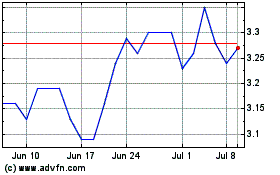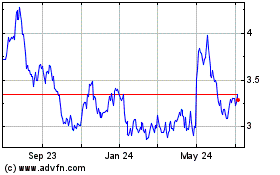RIO DE JANEIRO—As Brazil claws its way out of a brutal
recession, it is bearing an extra burden: its biggest
companies.
The country's best-known corporate names, including Petrobras,
Vale and Odebrecht, thrived during Brazil's economic rise,
delivering sizzling growth, investment and employment.
Now, many of those businesses are struggling, tainted by
corruption, mired in debt, fending off bankruptcy, or sometimes all
three. The scandals transcend borders and industries, and include
privately held, state-controlled and publicly listed companies.
What they have in common is the damage they have collectively
inflicted on Brazil and its global reputation. "Segments of the
corporate sector are seen as radioactive," said Gustavo Franco,
chairman of asset manager Rio Bravo and a former president of
Brazil's central bank.
In the past two years, corruption scandals have chased away
investors and thrown Brazil's political system into disarray,
dragging the economy into its worst downturn in at least a century.
Gross domestic product has likely contracted 7.1%, and economists
on Monday downgraded their 2017 growth forecast to just 0.7%.
"What Brazil really needs right now is a transformation in terms
of corporate governance, in terms of business ethics and values,"
says Cassia Carvalho, executive director of the Brazil-U.S.
Business Council.
Brazil's recovery prospects remain clouded by the troubles of
its behemoths. State-run Petró leo Brasileiro SA, or Petrobras, is
a case in point. In 2014, prosecutors uncovered a bid-rigging and
bribery ring that looted billions of reais from the oil giant over
the course of a decade.
In exchange for inflated contracts, crooked contractors funneled
kickbacks to Petrobras executives and dirty politicians. Several
hundred million reais have been paid back to the company from the
Swiss bank accounts of several participants in the scheme.
Petrobras says it was a victim of the scheme and is cooperating
with authorities.
Even so, Petrobras has written off some $37 billion to reflect
corruption-related losses, overvalued assets and falling oil
prices. It has slowed new projects drastically and is scrambling to
sell off assets to finance a debt load of $123 billion, the largest
in the global oil industry.
Since March 2011, Petrobras has lost $181 billion in market
capitalization, more than any company in the world. The runner-up,
mining giant Vale SA, is headquartered a few blocks away and has
shed $130 billion, according to FactSet. Vale has been roiled by
volatile commodity markets and is fighting a nearly $50 billion
lawsuit related to a dam failure at its Samarco joint venture that
killed 19 people last November.
Big construction companies, including Odebrecht SA, are accused
of forming a cartel to bilk Petrobras and remain blacklisted from
doing business with the government agencies they depend on for
contracts. Some have filed for bankruptcy protection; others are
watching their credit ratings spiral downward.
Odebrecht apologized on Dec. 1 for "improper practices in its
business activity" and said it "has learned several lessons from
its mistakes."
Among those enmeshed in various criminal investigations are
Brazil's biggest electric utility, state-run Centrals Elé tricas
Brasileiras SA, its two largest private-sector banks, Banco
Bradesco and Itaú Unibanco, as well as its largest steelmaker,
Gerdau SA, and executives from the world's largest meatpacker, JBS
SA.
Embraer SA, the homegrown aircraft maker that Brazilians have
long held up as an example of how they can compete globally, agreed
in October to pay $205 million to settle a U.S. foreign-bribery
investigation.
Eletrobras says it is aiding federal authorities, who are
focusing on its employees, contractors and suppliers.
Bradesco, Itau and Gerdau have denied wrongdoing. JBS says the
company the company itself isn't a target of investigations, and
its executives have denied wrongdoing.
Embraer says it "deeply regrets" the conduct of its employees
and agents who paid bribes in multiple countries and created false
records to conceal the payments.
Confidence in the Brazilian economy has rebounded since
left-leaning President Dilma Rousseff was impeached in August and
replaced by former Vice President Michel Temer, who is viewed as
pro-business. And investors appear to believe that authorities have
at least identified all the parties likely to be involved in the
corruption purge.
But for Brazil, kick-starting economic growth could prove a tall
order without help from its biggest companies, which have long
played an outsize role in driving investment. In 2013, Petrobras
alone accounted for almost 10% of total investment in the Brazilian
economy. As it slashed spending in subsequent years to stem its
soaring debt, Brazil's gross fixed investment dwindled for 10
consecutive quarters, deepening the recession.
Such carnage has ominous implications. The country's pervasive
red tape, a labor code that dates to the 1930s, and a Byzantine tax
system create formidable barriers to entry for outsiders or
startups that can't afford to employ armies of lawyers and
accountants. And double-digit interest rates make capital too
costly for companies without the reach to issue debt overseas.
Brazil's corporate giants have left the banking system saddled
with bad debt. Nobody knows the full extent of the problem, but
Credit Suisse said in September pegged the "troubled" debt of the
country's big companies at an unprecedented 818 billion reais. The
total doesn't include Petrobras's 398-billion-real debt pile.
Marcelo Telles, who wrote the Credit Suisse report, says
Brazilian companies will likely take several years to pare their
debt, assuming the economy rebounds. If they fail, Brazil could
face a credit crunch, he said.
To avoid the worst, "the economy needs to grow next year," Mr.
Telles said. "We need to take this very seriously."
(END) Dow Jones Newswires
December 13, 2016 08:25 ET (13:25 GMT)
Copyright (c) 2016 Dow Jones & Company, Inc.
Gerdau (NYSE:GGB)
Historical Stock Chart
From Mar 2024 to Apr 2024

Gerdau (NYSE:GGB)
Historical Stock Chart
From Apr 2023 to Apr 2024
